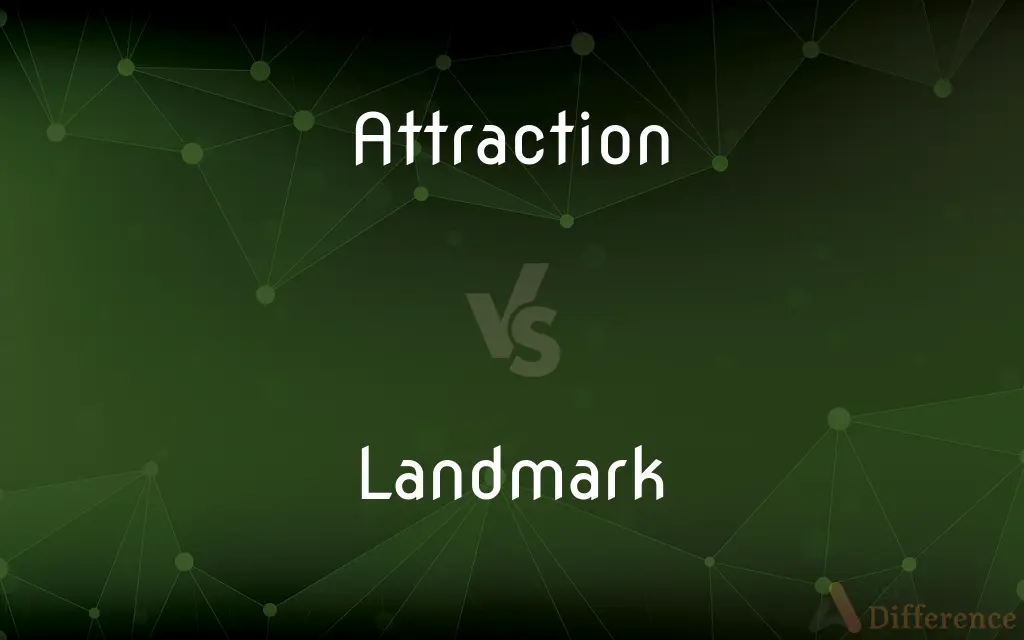Attraction vs. Landmark — What's the Difference?
Edited by Tayyaba Rehman — By Fiza Rafique — Updated on April 3, 2024
An attraction draws visitors through its appeal or activities, while a landmark is recognized for its historical, cultural, or natural significance.

Difference Between Attraction and Landmark
Table of Contents
ADVERTISEMENT
Key Differences
Attractions are diverse destinations that can range from natural wonders to man-made entertainment venues, designed to draw visitors looking for leisure, adventure, or educational experiences. Landmarks, on the other hand, stand as iconic symbols of a place, often imbued with historical, cultural, or geographical importance, serving as points of reference in a community or region.
While attractions are primarily geared towards providing visitors with enjoyable or informative experiences, landmarks may not always be intended for visitor engagement but gain attention due to their significance or distinctiveness. For example, an amusement park is an attraction offering entertainment, whereas the Statue of Liberty is a landmark symbolizing freedom and democracy.
The appeal of an attraction can be subjective, varying greatly among different individuals based on interests and preferences. Conversely, the status of a landmark is usually universally acknowledged due to its historical, architectural, or cultural significance, making it a universally recognized feature of a locale.
Attractions often involve an element of participation or interaction from the visitor, such as rides in a theme park or tours through a museum. Landmarks, while they can offer tours or visitor centers, are often appreciated for their visual or symbolic presence in the landscape, rather than for interactive experiences.
Many landmarks serve as attractions due to their fame or historical value, but not all attractions qualify as landmarks. A landmark goes beyond mere popularity or entertainment value to embody the heritage or identity of a place, often recognized officially by heritage organizations.
ADVERTISEMENT
Comparison Chart
Purpose
To entertain, educate, or engage visitors
To symbolize historical, cultural, or geographical significance
Visitor Engagement
High, often requiring active participation
Can be high or low, often viewed or appreciated
Recognition
Based on visitor interest and popularity
Universally recognized for importance or uniqueness
Examples
Theme parks, museums, zoos
Historical buildings, natural wonders, monuments
Nature
Can be natural or man-made
Often natural or historically/culturally significant structures
Compare with Definitions
Attraction
Designed to draw visitors for enjoyment or learning.
The new aquarium downtown has become a major attraction for families.
Landmark
Represents historical, cultural, or geographical importance.
The Eiffel Tower is an iconic landmark of Paris.
Attraction
Subjective, depending on individual interests and preferences.
Adventure seekers are drawn to attractions like bungee jumping and skydiving.
Landmark
Remains constant, serving as a point of reference.
Natural landmarks like Mount Everest have guided explorers for centuries.
Attraction
Can include natural wonders, cultural exhibits, or entertainment venues.
Attractions such as water parks offer summer fun for all ages.
Landmark
Subject to efforts to maintain its condition and legacy.
Historic landmarks often undergo preservation to protect their legacy for future generations.
Attraction
Can change or expand to maintain visitor interest.
The theme park introduces new rides every year to keep the attraction fresh.
Landmark
Attracts a wide range of visitors due to its significance.
Landmarks such as the Taj Mahal draw visitors from around the globe.
Attraction
Focuses on interactive or immersive experiences.
Visitors to the science museum can engage in hands-on experiments.
Landmark
Often officially recognized for its significance.
The Great Wall of China is recognized worldwide as a landmark of historical defense architecture.
Attraction
The act or capability of attracting.
Landmark
A landmark is a recognizable natural or artificial feature used for navigation, a feature that stands out from its near environment and is often visible from long distances. In modern use, the term can also be applied to smaller structures or features, that have become local or national symbols.
Attraction
The quality of attracting; charm.
Landmark
An object or feature of a landscape or town that is easily seen and recognized from a distance, especially one that enables someone to establish their location
The spire was once a landmark for ships sailing up the river
Attraction
A feature or characteristic that attracts.
Landmark
An event or discovery marking an important stage or turning point in something
The vaccine is a landmark in the history of preventive medicine
Attraction
A person, place, thing, or event that is intended to attract
The main attraction was a Charlie Chaplin film.
Landmark
A prominent identifying feature of a landscape.
Attraction
A force exerted between bodies that tends to draw or hold them together, such as gravitational force or the electric or magnetic force between bodies of opposite polarity.
Landmark
A fixed marker, such as a concrete block, that indicates a boundary line.
Attraction
The tendency to attract.
The Moon is held in its orbit by the attraction of the Earth's gravity.
Landmark
An event marking an important stage of development or a turning point in history.
Attraction
The feeling of being attracted.
I felt a strange attraction towards the place.
Landmark
A building or site with historical significance, especially one marked for preservation by a municipal or national government.
Attraction
(countable) An event, location, or business that has a tendency to draw interest from visitors, and in many cases, local residents.
The new mall should be a major attraction.
Star Tours is a very cool Disney World attraction.
Landmark
Having great import or significance
A landmark court ruling.
Attraction
(chess) The sacrifice of pieces in order to expose the enemy king.
Landmark
To accord the status of a landmark to; declare to be a landmark.
Attraction
(linguistics) An error in language production that incorrectly extends a feature from one word in a sentence to another, e.g. when a verb agrees with a noun other than its subject.
Landmark
(historical) An object that marks the boundary of a piece of land (usually a stone, or a tree).
Attraction
An invisible power in a body by which it draws anything to itself; the power in nature acting mutually between bodies or ultimate particles, tending to draw them together, or to produce their cohesion or combination, and conversely resisting separation.
Landmark
A recognizable natural or man-made feature used for navigation.
Attraction
The act or property of attracting; the effect of the power or operation of attraction.
Landmark
A notable location with historical, cultural, or geographical significance.
Attraction
The power or act of alluring, drawing to, inviting, or engaging; an attractive quality; as, the attraction of beauty or eloquence.
Landmark
A major event or discovery.
An important landmark in human history
A landmark paper in neurosurgery
A landmark ruling/case
Attraction
That which attracts; an attractive object or feature.
Landmark
(US) To officially designate a site or building as a landmark.
Attraction
The force by which one object attracts another
Landmark
A mark to designate the boundary of land; any mark or fixed object (as a marked tree, a stone, a ditch, or a heap of stones) by which the limits of a farm, a town, or other portion of territory may be known and preserved.
Attraction
An entertainment that is offered to the public
Landmark
Any conspicuous object on land that serves as a guide; some prominent object, as a hill or steeple.
Attraction
The quality of arousing interest; being attractive or something that attracts;
Her personality held a strange attraction for him
Landmark
A structure that has special significance, such as a building with historical associations;
Attraction
A characteristic that provides pleasure and attracts;
Flowers are an attractor for bees
Landmark
An event or accomplishment of great significance; as, Brown v. Board of Education was a landmark of the civil rights movement. Also used attributively, as a landmark court decision.
Attraction
An entertainer who attracts large audiences;
He was the biggest drawing card they had
Landmark
The position of a prominent or well-known object in a particular landscape;
The church steeple provided a convenient landmark
Landmark
An event marking a unique or important historical change of course or one on which important developments depend;
The agreement was a watershed in the history of both nations
Landmark
A mark showing the boundary of a piece of land
Landmark
An anatomical structure used as a point of origin in locating other anatomical structures (as in surgery) or as point from which measurements can be taken
Common Curiosities
What are examples of attractions and landmarks?
Attractions: amusement parks, museums. Landmarks: the Statue of Liberty, Mount Everest.
How do attractions differ from landmarks?
Attractions focus on providing visitor engagement and entertainment, while landmarks are recognized for their importance or symbolism.
What defines an attraction?
An attraction is a place designed to draw visitors by offering enjoyable, entertaining, or educational experiences.
What makes a landmark significant?
A landmark is significant for its historical, cultural, or natural importance, often recognized as a symbol of a place.
Why do people visit attractions?
People visit attractions for leisure, adventure, or to gain knowledge and experiences.
Do attractions contribute to the local economy?
Yes, attractions significantly contribute to the local economy by drawing tourists and supporting local businesses.
How are attractions developed?
Attractions are developed based on visitor interests, incorporating elements of entertainment, education, or leisure activities.
Can a landmark also be an attraction?
Yes, many landmarks are also attractions if they draw visitors due to their significance or beauty.
What role do landmarks play in tourism?
Landmarks serve as must-visit places for tourists, offering them a connection to the history, culture, or identity of a place.
What efforts are made to preserve landmarks?
Preservation efforts can include restoration, protection laws, and community involvement to maintain the landmark’s integrity.
Can natural features be considered landmarks?
Yes, natural features like mountains, lakes, or forests can be landmarks if they hold significant geographical or cultural value.
How do personal preferences influence attraction visits?
Personal preferences, such as interests in history, art, or adventure, significantly influence which attractions individuals choose to visit.
Are all landmarks ancient or historical?
Not all, some are recognized for their architectural innovation or cultural significance in recent times.
What impact do landmarks have on a community?
Landmarks often serve as symbols of pride and heritage, fostering a sense of identity and community.
Are landmarks always accessible to the public?
While many landmarks are accessible, some may have restrictions to preserve their condition or for safety reasons.
Share Your Discovery

Previous Comparison
Funny vs. Goofy
Next Comparison
Leprechaun vs. FairyAuthor Spotlight
Written by
Fiza RafiqueFiza Rafique is a skilled content writer at AskDifference.com, where she meticulously refines and enhances written pieces. Drawing from her vast editorial expertise, Fiza ensures clarity, accuracy, and precision in every article. Passionate about language, she continually seeks to elevate the quality of content for readers worldwide.
Edited by
Tayyaba RehmanTayyaba Rehman is a distinguished writer, currently serving as a primary contributor to askdifference.com. As a researcher in semantics and etymology, Tayyaba's passion for the complexity of languages and their distinctions has found a perfect home on the platform. Tayyaba delves into the intricacies of language, distinguishing between commonly confused words and phrases, thereby providing clarity for readers worldwide.
















































